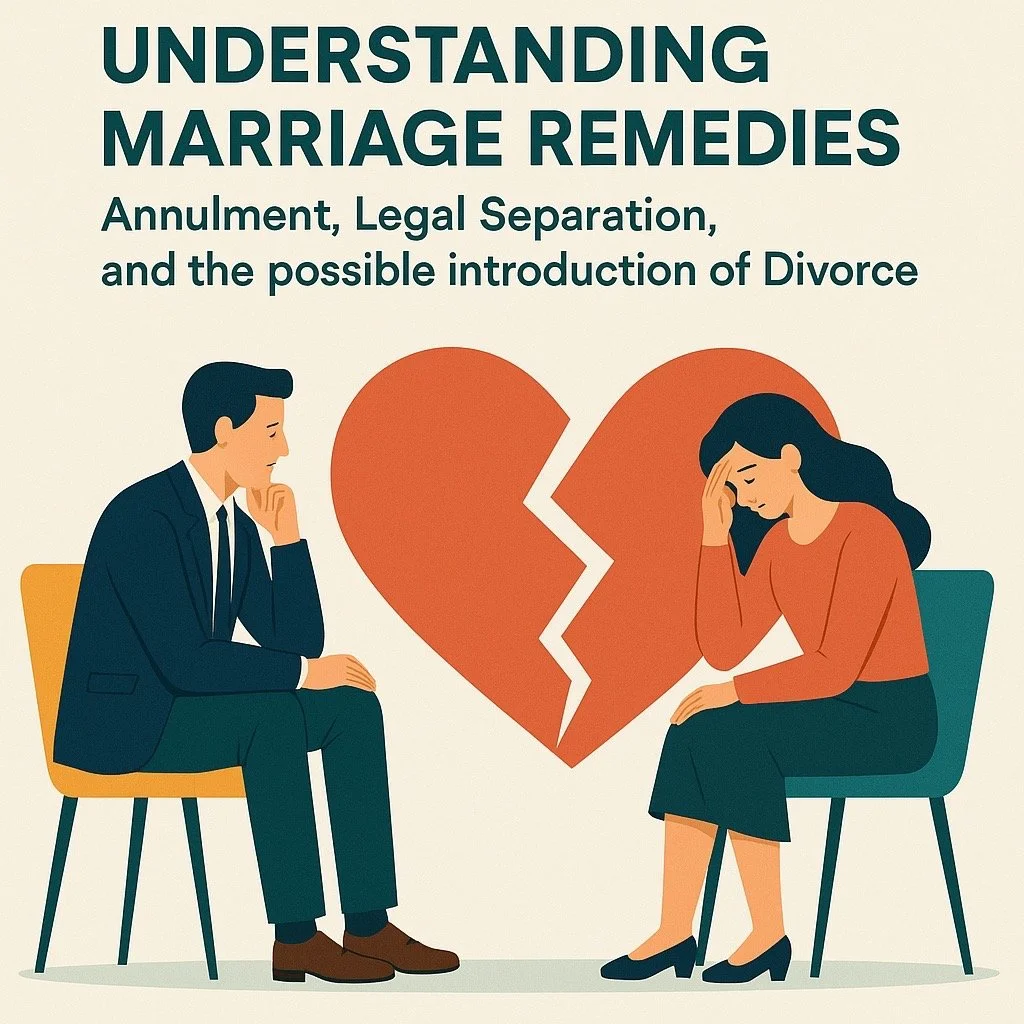Annulment, Legal Separation, and the Possible Introduction of Divorce In the Philippines
What remedies are available if a marriage breaks down in the Philippines?
At present, the law provides two main remedies for troubled marriages: annulment and legal separation. Both remedies recognize serious marital problems but address them in different ways.
There is also a proposed law — the Absolute Divorce Bill — which, if passed, will introduce divorce as an additional option. However, as of now, divorce is not yet legal in the Philippines.
What is annulment, and how does it work?
Annulment is a legal process where a marriage is declared voidable because certain legal defects existed at the time it was celebrated. It is not enough that problems arose later; annulment specifically addresses flaws present from the beginning.
The grounds for annulment include psychological incapacity, fraud, coercion, lack of parental consent, and physical incapacity to consummate the marriage. A successful annulment treats the marriage as if it never legally existed, although the rights of children are protected.
The process involves filing a petition in court, presenting evidence, and often undergoing psychological evaluation. Matters such as custody of children, support, and division of property are also decided as part of the annulment proceedings.
How is annulment different from legal separation and divorce?
Annulment legally erases the marriage based on defects that existed from the start. Once annulled, the parties return to their single status and may remarry.
Legal separation, on the other hand, does not dissolve the marriage. The spouses remain married but are legally allowed to live separately and to divide their properties. Remarriage is not permitted after legal separation.
Divorce, if legalized, would offer a full dissolution of marriage based on causes that occur after the marriage began — such as irreconcilable differences or domestic violence — and would allow both parties to remarry.
What is legal separation, and when is it appropriate?
Legal separation allows spouses to live apart without ending the marriage bond. It is available when serious grounds exist, such as physical violence, habitual addiction, infidelity, or abandonment.
Through legal separation, the court settles issues like child custody, property division, and financial support, but the marriage remains intact. Neither spouse may remarry after obtaining a decree of legal separation.
It is an option often chosen by individuals who wish to separate their lives and protect their rights without dissolving the marriage itself.
What is the Absolute Divorce Bill, and what would it change?
The Absolute Divorce Bill (House Bill No. 9349) proposes to introduce divorce as a legal remedy. If passed, it would allow a valid marriage to be dissolved when it has broken down beyond reconciliation.
Grounds for divorce under the proposed law include irreconcilable differences, domestic violence, psychological incapacity, and separation for at least five years. Divorce may also be granted by mutual agreement under strict conditions.
The bill requires a sixty-day cooling-off period after filing a divorce petition, encouraging reconciliation efforts before finalizing the divorce. It also prioritizes the protection of children's rights and ensures fair distribution of marital assets.
As of today, the bill is pending in the Senate and has not yet become law.
What is the Philippines’ traditional position on divorce?
Historically, the Philippines has upheld marriage as a permanent and sacred union. Influenced strongly by Catholic teachings, the legal system has resisted introducing divorce, fearing it might weaken family structures and moral values.
Opponents of divorce emphasize the importance of preserving marriage, while supporters argue that compassion and justice demand offering an exit from abusive or irreparable marriages.
The debate reflects the ongoing effort to balance respect for marriage with the need to protect individuals who are suffering within broken relationships.
What should someone do if they are considering annulment or legal separation?
Anyone facing marital difficulties should seek legal advice as early as possible. Each remedy — annulment, legal separation, and potentially divorce — has its own requirements, processes, and consequences.
An experienced family lawyer can help assess which remedy fits a person's specific situation, prepare the necessary evidence, and guide them through what is often a sensitive and emotional process.
Proper legal guidance ensures that individuals are protected and that their rights, as well as the best interests of any children involved, are fully respected.
Final Note On Marriage Dissolution
Marriage dissolution is a serious and deeply personal matter. Whether through annulment, legal separation, or, in the future, divorce, individuals deserve legal remedies that reflect both their dignity and their needs.
If you are considering your options, seeking experienced legal assistance is the first step toward clarity and peace of mind.
*This blog post is intended for informational and academic purposes only and does not constitute legal advice. Readers are encouraged to consult a qualified lawyer for advice specific to their individual circumstances.
Need legal help?
Contact us and set an appointment today. Our team is ready to guide you through every step with clarity, compassion, and legal precision.
